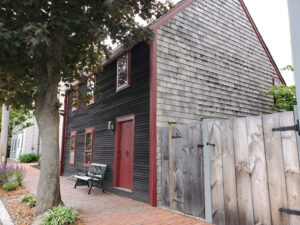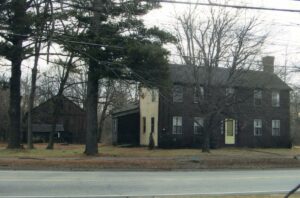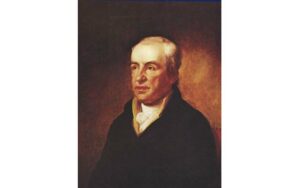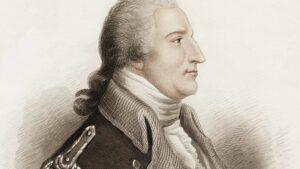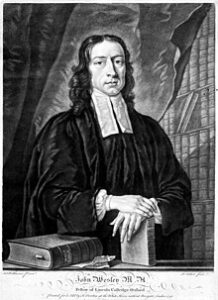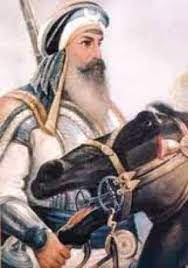Americanism Redux
January 18, your today, on the journey to the American Founding, 250 years ago, in 1774
The tea rings continue rolling beyond Boston Bay from a month ago.
“It was done by Fire and Water; and so general was the spirit, that all ranks and degrees of people, high and low, rich and poor, Whig and Tory, agreed in the affair.”
So described an observer in Newburyport, colony of Massachusetts, the latest to participate in protest through the burning and dumping of tea. A group of colonial rights supporters and anti-tea law protesters—are they one and the same by now?—did the deed. The difference in Newburyport was the other step of fire-burning. The smoke and flames make an angrier sight than in Boston. The eyes are drawn to a consuming destruction instead of a collaborative participation.
(a Newburyport home, standing in 1774)
Also in northern New England, dozens of people in Hampton, colony of New Hampshire, shake off the snow and stamp out the cold to attend a town meeting. One by one they find a seat. Faces forward and the question posed: now what? After discussion, they raise hands to vote in favor of describing the tea tax and tea laws as “unreasonable and unconstitutional.” How could another conclusion be possible, they wondered, if a person was “not lost to virtue nor devoid of common sense.” More hands raised. Left unchecked, they predicted these British policies “will be totally destructive to our natural and constitutional rights and liberties, and have a direct tendency to reduce the Americans to a state of actual slavery.” Hands held high.
Staying in coastal New England on this day, 250 years ago, but located out on the rocky coast of Marblehead, several men are wearing painted faces, leather shirts, and feathers tied to their hair. They’ve traveled to Marblehead’s controversial smallpox hospital in search of one of the people who had quietly carried shipwrecked tea to Cape Cod for sale and use. Their mission was to make an example of the silent, tea-hauling man as someone who hadn’t complied with the tea protests. It was only after learning the man was ill that they let him be, safe for the moment from confrontation, threats, and punishment. A church pastor who heard about this quasi-Mohawk squad wondered aloud if witches were again loose in Salem: “was it not said that the People in Boston did their utmost to prevent the Property of the East India Company, from being destroyed, and Resentment must now fall on those who endeavored to save Part of the same Property!” It had to be witchcraft, the pastor noted, to turn a man into a target for showing the same concern for protecting tea as Boston’s protesters had done.
Up and down the New England coast 250 years ago today, the tea rings go outward in ripples and waves. At issue is both the question of rights and liberties along with that of violence and nonviolence. The extent to which the tea protests resemble each other or not will be one measure of cohesion and common ground. The result of the measure will reveal the depth of resilience for future events. How many fathoms deep will it run?
* * * * * * *
Ten families have their own resilience today, 250 years ago. They live near Stonington, colony of Connecticut, on the coast a few miles west of the Rhode Island border. They’re smiling because they had a shared goal and today it’s been achieved. They are members of the Narrangansett tribe in Stonington, some fully native and others bi-racial. The parents and families had wanted their children to attend a special English school. The school needed a teacher and today he’s been found and selected. His name is William Pendleton, part-Narrangansett, and he’s informed the ten families that he’s passed an informal reading and writing test to qualify as the new teacher. Pendleton tells them he’ll be on a one-month probationary period to show that he can function as their children’s teacher. The school will be in Stonington, the latest among several that have been organized in the town.
The ten Narragansett families walk a high wire in clinging to an encircled culture while wanting a more secure life for their children in the British world. The effort is all the more difficult with local colonists and imperial officials arguing over rights, laws, power, and force. Perhaps the best prospect for the ten families is that things calm down and no hard choices will need to be made. The teacher is picked and school will start soon.
(modern keepers of Narrangansett ways)
* * * * * * *
The ability to read sought by the Narragansett families is a cherished activity in the home of Ebenezer Parkman, resident of Westborough, colony of Massachusetts. Parkman himself encourages reading and writing. With snow high against the walls of his house, Parkman and his family use the time indoors to read for pleasure and purpose.
Ebenezer has chosen ” A Master Key To Popery” by Antonio Gavin. Gavin’s book, written fifty years ago. Gavin had converted from Catholicism to Protestantism and filled his book with wild tales of sexual and physical abuse committed by priests and nuns. Gavin’s book was republished in the colony of Rhode Island only a year ago. Parkman, a Christian minister and a ferocious anti-Catholic, immediately bought the book and now immerses into it as a traveler might consult a map, learning the supposed signs and hints for potential insertion into one of his Sunday sermons. He’s always interested in criticizing the Catholic Church and he can’t stop reading the shocking stories inside the book.
Ebenezer’s son, Elias, has a different book in his hands for this day, 250 years ago. He’s reading a collection of writings by the Roman poet, Virgil. Virgil’s poems include the land and rural life among his topics, which outside the Parkman house right now are blanketed by snow and ice. Virgil also writes about the challenges and tribulations faced by a war hero, stirring stuff for a young Parkman son stuck inside on a frigid winter’s day. Whichever of Virgil’s poems Elias reads at any given moment, it’s fitting because of all the chatter lately about Boston’s most talked-about poet, the black teenager Phillis Wheatley, whose writings sound much like those of Virgil. Elias will have much to contribute if a local conversation turns to the topic of Wheatley.
Today, 250 years ago, a fire crackles in the Parkman fireplace. Next to the glowing heat, father and son sit in their chairs, each holding a hard-bound book with words on the printed page. Their minds and thoughts turn with the stiff paper. Every few minutes, a Parkman looks up and ponders, a Parkman looks up and wonders. Neither of the Parkmans, however, can know that an invisible author now writes an unwritten book with no chapters, no ending. This mysterious book will, in a few years’ time, compel Catholic and Protestant to face each other, will spread war across the snow, will split the land into sides of hero and villain, all of it outside the walls, in the snow. Once the invisible writing is lived, future books will be written in the quest to know what happened.
(the Parkman home)
* * * * * * *
A writer sends a message to John Dunlap in Philadelphia, colony of Pennsylvania. Dunlap is a newspaper owner and printer and thus an important media leader in Philadelphia. The writer has closely observed the anti-slavery moment gaining momentum in the community over the past months. That momentum has occurred alongside the tea protests in Philadelphia.
The writer persuades Dunlap that a significant piece of information has been missing in the anti-slavery debates. Dunlap, who has published both pro- and anti-slavery writings in his media outlet, agrees to insert the writer’s complicated essay into this week’s edition of the American Daily Advertiser. Indeed, it’s the second featured article in the edition, following an essay on how women can protect themselves from malicious men.
The unnamed writer outlines a series of mathematical calculations, projections, and extrapolations to make the case that emancipation of enslaved people would raise public welfare costs in Philadelphia. The fundamental assumption beneath the data is the writer’s view that freedmen and women would have no skills or abilities to earn wages and livelihoods for themselves. The consequence, the writer asserts, is they would depend on public charity—thus, rising public costs come with rising rates of emancipation.
The writer ends with this: “For though such an indulgence [as emancipation] is wished to be granted to such as are conscientiously scrupulous of holding their fellow-creatures in perpetual bondage; it is reasonable that the public, at the same time, should be cautiously guarded against any injurious consequences.”
Dunlap’s readers may stumble in trying to follow the writer’s complicated formulations. Whether they make sense of the numbers or not, though, they’ll be quicker in knowing their predispositions about wages and livelihoods and the nature of securing them. A better quest would be to know how the stress and weight of events will test these beliefs. Speed and density together will leave a lasting mark.
(John Dunlap)
* * * * * * *
Today, 250 years ago, two men of business are thrashed with complications of the marketplace.
Joshua Johnson is a London merchant, trader, and financier with partners and clients in the colony of Maryland. Johnson laments the varying quality of Chesapeake tobacco that arrives at his English warehouses, a substance that he relies on for reselling to pay his creditors and investors. He also shows frustration over insurance, the cost of employees, and the risks of long lapses of time in making decisions.
Benedict Arnold is a New Haven, merchant, shipper, and enslaver from the colony of Connecticut. He’s now on the island of St. Croix in the Caribbean Sea, his ship docked. He’s angry about a dispute over money, promises, and trade goods. Makes threats and vows revenge. Looks around for enslaved black boys to buy and sell. In recent months he’s met a young man, an islander, named Alexander Hamilton, who is clearly smart, quick-thinking, and ambitious. Soon, a still-simmering Arnold will order his vessel to weigh anchor and head north toward the New England coast.
(Arnold in his American military uniform)
Also
The British preacher John Wesley writes from London to a friend: “Let not mercy or truth forsake you whatever company you are in, but bind them about your neck and write them on the tablet of your heart.” Put plainly, speak truthfully and show compassion and forgiveness to your listeners. That’s Wesley’s advice.
(John Wesley)
Sardar Baghel Singh Dhaliwal is a Sikh miliary commander. At the head of 40,000 soldiers he invades the ancient city of Delhi today, 250 years ago. His goal for this fourth major invasion in the past thirteen years is to seize and plunder Mughal territory, beginning with this city (in modern north-central India) between the Yamuna River and the hills of the Aravalli Range. Baghel Singh knows battlefield tactics, how to motivate soldiers, and is comfortable negotiating between leaders of different factions and groups, including the British. He is confident and self-assured, an attitude rooted in his knowledge of royal descent among Sikhs. He is fighting in the latest stages of a Sikh-Mughal conflict that began in 1606.
(Sardar Baghel Singh Dhaliwal)
Inside Britain, a native innovator of religion shares advice. Outside Britain, a native commander in a religious-based conflict—a part-time ally, part-time rival, part-time game-changer with British imperial representatives—leads an assault on a city.
British shadows touch an entire world.
For You Now
“If we let things stay as they are, they’ll turn out fine.”
I took a hike today and this phrase rang in my head as I thought about today’s entry. Imagine saying that to some of the people we’ve just met.
Tell it to the ten Narrangansett families. Don’t teach the kids to read and write and everything will be fine.
Tell it to anyone reading the essay in Dunlap’s newspaper. Those who favor enslavement will agree, everything will be fine. But surely those who question or oppose enslavement will think otherwise, while those who are enslaved will laugh or cry at the assumption.
Tell it to the two businessmen. They’ll roll their eyes at the thought that anything stays the same for longer than a minute. One of them, Joshua, will sigh and continue. The other, Benedict, will file it away and remember to remember.
Tell it to the Parkmans. Out their windows is a winter scene that feels frozen and unchanging. In their hands are ideas and interpretations that glow with heat, melting whatever they touch, changing static ice to flowing water.
Tell it to the people living in the ripples and waves of tea laws, tea officials, and anti-anything that looks like tea. How do you think they’ll react to the assurance of leaving things alone to stay the way they are?
I suppose it’s about definition of terms, isn’t it? Go back to the quote at the top of this section.
“We”… “things”…”fine”.
There’s a world of ways in which you can think about those words. Is there any way you can imagine them applying anymore to us than they do to them?
I can’t.
(deceptively unchanging)
Suggestion
Take a moment to consider this: what kind of leader will young William Pendleton, the new Narrangansett teacher, need to be?
(Your River)
